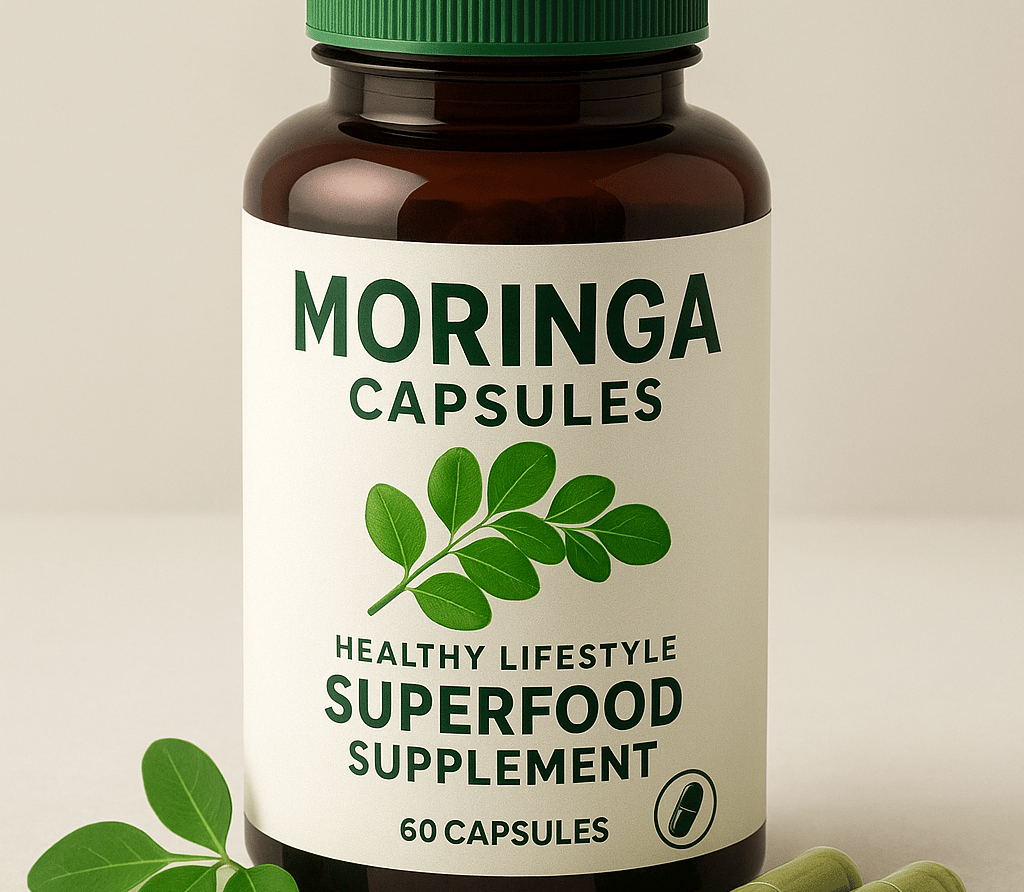Green Power in a Capsule: Moringa Benefits
Discover the magic of moringa, the green power in a capsule. Learn about its incredible benefits and how it can enhance your health and wellness. "green power"
9/4/20257 min read


Introduction to Moringa
Moringa, scientifically known as Moringa oleifera, is a plant that has garnered significant attention due to its remarkable nutritional properties and health benefits. Native to the Indian subcontinent, moringa is often referred to by various names, such as the drumstick tree, miracle tree, and ben oil tree. Its versatility and utility have contributed to its growing prominence not only in its region of origin but also globally.
The historical usage of moringa dates back thousands of years, where it was utilized in traditional medicine systems, particularly in Ayurveda and traditional African medicine. Various parts of the moringa plant—leaves, seeds, and roots—have been used to treat a variety of ailments, ranging from inflammation and malnutrition to digestive issues and skin conditions. This rich history in alternative medicine underscores the plant's long-standing legacy as a valuable resource.
The rise of dietary supplements and natural health products has further cemented moringa's status as a superfood. With its ease of incorporation into various forms—such as powdered supplements, teas, and capsules—moringa offers a convenient way for individuals to enhance their nutritional intake. As more research continues to explore its various health benefits, the demand for moringa products is likely to increase, solidifying its place in contemporary health culture.
Nutritional Profile of Moringa
Moringa, often referred to as the “miracle tree,” boasts an impressive nutritional profile that contributes significantly to its status as a superfood. This remarkable plant is rich in essential vitamins, minerals, and antioxidants, making it a valuable addition to any diet. One of the most notable aspects of moringa is its high concentration of vitamin A, which supports vision and immune function. Just a single serving can provide a substantial percentage of the recommended daily intake, underscoring its role in maintaining overall health.
Additionally, moringa is an excellent source of vitamin C, a powerful antioxidant that aids in the protection of cells from oxidative stress. This component not only promotes healthier skin but also enhances the immune system's efficiency. Furthermore, moringa contains vital minerals such as calcium and iron, which are essential for bone health and the production of red blood cells, respectively. This mineral-rich profile makes moringa particularly beneficial for those who may be at risk of deficiencies.
Another impressive feature of moringa is its high content of chlorophyll. This green pigment, known for its detoxifying properties, is believed to support the body in eliminating harmful toxins while promoting overall digestive health. Additionally, moringa is a source of omega-3 fatty acids which are known for their heart health benefits, contributing to improved cardiovascular function.
Besides vitamins and minerals, moringa provides numerous beneficial compounds such as flavonoids and phenolic acids, which exhibit anti-inflammatory properties. These compounds further enhance the nutritional value of moringa, securing its position as a powerhouse of nutrients essential for maintaining a healthy lifestyle.
Health Benefits of Moringa
Moringa, often heralded as a superfood, offers an impressive array of health benefits that have been recognized over centuries of traditional use. One of the most significant properties of moringa is its potent anti-inflammatory effects. Chronic inflammation is linked to many diseases, including heart disease and arthritis. Compounds found in moringa, such as quercetin and chlorogenic acid, have been shown to inhibit inflammatory processes in the body, thereby reducing pain and aiding recovery.
Another critical advantage of incorporating moringa into one's diet is its potential impact on blood sugar regulation. Several studies indicate that moringa extracts can lower blood sugar levels, making it a valuable supplement for those managing diabetes. The high content of antioxidants in moringa helps combat oxidative stress, which is often a contributing factor to insulin resistance.
Additionally, moringa may play a role in reducing cholesterol levels. Research has suggested that moringa can help lower both total and LDL cholesterol, thereby supporting cardiovascular health. This effect can be particularly beneficial for individuals at risk of heart disease, as maintaining healthy cholesterol levels is fundamental to overall heart health.
The immune-boosting properties of moringa are also noteworthy. Rich in vitamins such as A, C, and E, as well as essential amino acids, moringa enhances the body’s natural defenses against infections. Regular consumption of moringa can lead to improved immune function, providing a shield against various illnesses.
Testimonials from users often highlight their increased energy levels and overall well-being after incorporating moringa into their diets. Clinical studies further support these findings, illustrating the multifaceted health benefits of this remarkable plant. Overall, the consumption of moringa can significantly contribute to improved health and wellness, establishing it as an invaluable addition to a balanced diet.
Moringa in Cooking and Smoothies
Moringa, often heralded as a superfood, presents versatile opportunities for incorporation into various culinary practices, particularly through cooking and smoothies. This leafy green can be utilized in both powdered form and fresh leaves, allowing for flexibility in how one can enjoy its nutritional benefits. When integrating moringa powder into cooking, it is vital to recognize its potency; typically, one to two teaspoons per serving suffices to enhance flavor and nutritional value without becoming overwhelming.
In soups and stews, moringa powder can be added during the last few minutes of cooking to preserve its nutrients. Similarly, it works well in sauces, where a spoonful can be mixed in to provide an earthy note and a vibrant green color. Stirring moringa powder into grain dishes such as quinoa or rice not only boosts nutrition but also complements the dish aesthetically. Furthermore, moringa can serve as an enriching ingredient for salads, where fresh moringa leaves can be chopped finely and sprinkled on top, or blended into a dressing for an added kick.
Smoothies represent another ideal medium for consuming moringa. Combining a teaspoon of moringa powder with fruits like bananas, mangoes, or berries creates a nutrient-rich blend that is both flavorful and energizing. The subtle taste of moringa pairs well with naturally sweet fruits, thus allowing the overall flavor to remain balanced. For those new to moringa, starting with smaller amounts and gradually increasing as preference is developed can be beneficial. A smoothie serving consisting of one cup of fruit, one cup of leafy greens, and one to two teaspoons of moringa powder is a practical guideline to follow. By taking these simple steps, individuals can effectively incorporate moringa into their dietary routine, reaping its many health benefits while enjoying delicious meals and beverages.
Sustainable Farming and Growing Moringa
Sustainable farming practices play a crucial role in the cultivation of moringa, a plant renowned for its nutritional benefits and environmental contributions. Moringa, also known as the "drumstick tree," thrives in various soils and climates, making it an ideal crop for sustainable agricultural systems worldwide. Being a hardy plant, it requires minimal water and can easily grow in poor soil conditions. This resilience allows moringa to be cultivated in areas that are typically challenging for traditional crops, thus promoting food security without straining local resources.
The environmental advantages of growing moringa extend beyond its cultivation. As a fast-growing tree, moringa has the ability to improve soil health and prevent erosion. Its deep-root system enhances soil fertility by breaking down compacted layers and promoting nutrient accumulation. Moreover, the cultivation of moringa contributes to biodiversity, providing a habitat for various species and supporting ecosystem stability. By integrating moringa into agroforestry systems, farmers can create a synergistic environment that benefits both crops and livestock, reducing the need for chemical fertilizers and pesticides.
For individuals interested in growing moringa at home or in gardens, the process is straightforward. Moringa seeds can be planted directly into the ground or started indoors in pots. It is advisable to sow seeds during the warmer months to take advantage of optimal growing conditions. When planting moringa, ensure that the chosen location receives plenty of sunlight and has good drainage. Water the seedlings regularly, especially during dry periods, while also considering the use of organic compost to enhance soil quality. With minimal maintenance, moringa can flourish and provide a sustainable source of nutrition while promoting environmental health.
Potential Side Effects and Considerations
While moringa is widely recognized for its numerous health benefits, it is equally important to consider the potential side effects associated with its consumption. The leaves, pods, and seeds of the moringa tree are rich in vital nutrients, yet they may also pose certain risks, particularly when consumed in excessive amounts. Gastrointestinal discomfort, including symptoms like diarrhea, nausea, and gas, can occur, especially for first-time users or those who consume moringa in large quantities. Therefore, moderation is key for those incorporating this superfood into their diet.
Additionally, moringa can interact with various medications, which is an important consideration for individuals who are currently under treatment. Moringa has been noted to have hypoglycemic effects, which may enhance the effectiveness of diabetes medications, thus leading to dangerously low blood sugar levels. Similarly, moringa may have blood-thinning properties that could interfere with anticoagulants like warfarin, potentially increasing the risk of bleeding. Consequently, it is critical that individuals taking such medications consult a healthcare professional before adding moringa to their regimen.
Certain populations should exercise particular caution regarding moringa consumption. Pregnant women may experience complications as certain compounds found in moringa can lead to uterine contractions, posing potential risks to both mother and child. Likewise, breastfeeding mothers should consult a healthcare provider, as the effects of moringa on lactation remain insufficiently studied. Overall, while moringa offers an array of health advantages, being mindful of its potential side effects and interactions is paramount. Anyone considering the use of moringa should prioritize moderation and professional guidance to ensure safe consumption.
Conclusion: Embracing Moringa as a Superfood
In recent years, moringa has gained recognition as a powerful superfood, attributed to its remarkable nutritional profile and numerous health benefits. With its high concentrations of vitamins, minerals, and antioxidants, moringa stands out as a viable option for enhancing well-being and supporting overall health. This green powerhouse offers a plethora of advantages, such as improved digestive health, increased energy levels, and enhanced immune function, making it an attractive addition to a balanced diet.
Moreover, moringa is revered for its potential anti-inflammatory properties, which may help combat chronic diseases and promote better health. The leaves, pods, and seeds of the moringa tree can easily be incorporated into various meals, whether in powder form mixed into smoothies or as a supplement. Its versatility makes it accessible for individuals seeking to improve their nutritional intake. The integration of moringa into daily routines not only facilitates a transition towards healthier eating habits but also encourages the consumption of natural remedies.
Considering the myriad of benefits moringa offers, it becomes increasingly important for individuals to explore and harness the potential of this superfood. By making informed dietary choices and respecting the wisdom of nature, one can effectively adapt to healthier lifestyles. Engaging with moringa is not only a step towards better health but also an exploration of holistic wellness. As more individuals become aware of moringa's magic, it is likely that this remarkable superfood will continue to gain traction, further solidifying its place in the realm of health and nutrition.
Wellness
Experience vitality with our natural herbal solutions—crafted to boost immunity, detoxify, and energize. Pure, plant-based wellness for everyday health, rooted in Ayurvedic tradition.
Contact us
support@mleaf.co.in
+91-9911382286
© 2025. All rights reserved.
